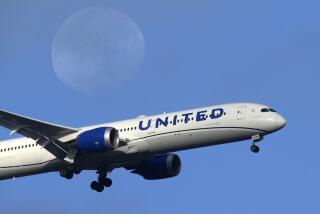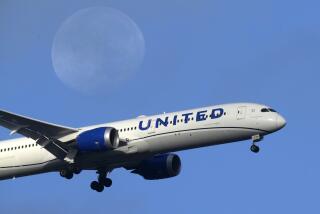Merger to Create Less-Biased Airline Reservation System : Transportation: United Airlines will combine its network with one from a group of European carriers.
- Share via
Two major airline computer reservation systems will be combined into a single, potentially more efficient and equitable transatlantic network after a merger that is expected to be announced today in Amsterdam between a United Airlines affiliate and a company formed by a group of European airlines, industry sources said Tuesday.
Details were not immediately available on the proposed merger between Covia, the Rosemont, Ill.-based company that is majority owned by United and that operates the Apollo reservations system, and the Galileo network, which is owned by KLM Royal Dutch Airlines and eight other European carriers.
But analysts said the merger would likely spur consolidation among competing computer reservation systems and contribute toward distancing these systems from the proprietary interests of the airlines that have traditionally controlled them. The result would be less bias toward particular airlines in the systems, which are used by travel agents to book flights for air passengers.
“I think the long-term trend is that the major computer reservation systems will become large, stand-alone companies,” said Hans Plickert, a Connecticut-based independent aviation consultant. “United already took one step in that direction when it set up its Covia unit.”
Apollo’s major U.S. competitor, the Sabre system, remains an internal division of American Airlines, and it may feel pressure to become more independent or ally more closely with a second European computer reservation system, Amadeus, Plickert said.
Computerized reservations were made exclusively by individual airlines until the mid-1970s, when United and American opened their systems to travel agents, allowing them to be used for universal bookings of scheduled flights by most airlines. A third major system, Worldspan, is owned by Northwest, Delta and TWA.
The benefits of pooling resources for economies of scale and avoiding duplication will naturally lead to further consolidation, especially now that the technology is sophisticated enough to allow “seamless compatibility” between various systems, said Daniel M. Kasper, an analyst at the Cambridge, Mass. aviation consulting firm, Harbridge House Inc.
“From a marketing point of view, the network is more valuable if it gives convenient access to a greater number of travel agents,” Kasper said.
Ed Bergstraesser, a spokesman for Covia, said Apollo and Galileo had collaborated closely for many years before deciding to merge operations. A former United executive is president of the European concern. KLM and other European carriers hold minority interest in Covia.
“We are partners already, and we’ve shared important products like RoomMaster and CarMaster, which help travel agents book hotels and car rentals,” Bergstraesser said. “We’ve shared information and development for many years.”
The merger of the two systems is unlikely to have any immediate impact on how travel agents perform their work, or affect cost or convenience to passengers, Harbridge House’s Kasper said. It could result in slightly lower operations costs for participating airlines, but these will probably not be passed on to consumers, he added.
More to Read
Inside the business of entertainment
The Wide Shot brings you news, analysis and insights on everything from streaming wars to production — and what it all means for the future.
You may occasionally receive promotional content from the Los Angeles Times.










